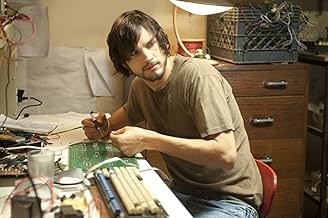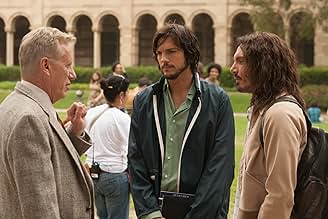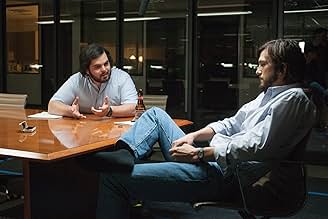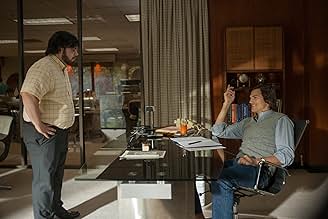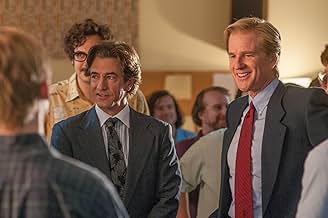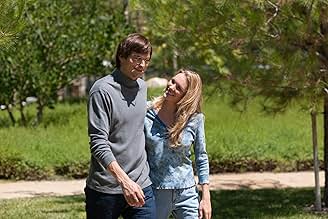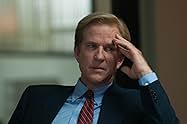L'ascesa di Steve Jobs dall'abbandono del college fino a diventare uno dei più creativi e venerati imprenditori del ventesimo secolo.L'ascesa di Steve Jobs dall'abbandono del college fino a diventare uno dei più creativi e venerati imprenditori del ventesimo secolo.L'ascesa di Steve Jobs dall'abbandono del college fino a diventare uno dei più creativi e venerati imprenditori del ventesimo secolo.
- Premi
- 2 candidature totali
Recensioni in evidenza
What does this film do well? The first half of it captures the look and feel of early home computing in a totally realistic way - the kind of people who were involved, the way that they dressed, what early homemade personal computers in the 1970s looked like. What did they look like? It was like the first cars when they were called "horseless carriages" because that's what people AND the inventors understood as the old paradigm. The horse was being replaced with an engine and the rest of the car looked like carriages always had looked. So the earliest computers had switches and lights and sat in unattractive blue boxes that engineers thought were great, but the average person had no idea what to do with such a thing and didn't want one.
What did this film do poorly? I'd say Steve Wozniak is presented as a mere shadow of himself here. You never see the camaraderie or dynamic between himself and Jobs. The old Home Brew Club looked up to Wozniak, and when he presents the first "Apple" computer to them they just look bored and Woz looks scared.
Finally I come to Ashton Kutcher. Ashton Kutcher's problem is that he did one of his earliest roles so well and so long - that of mega screw up Kelso in the long running TV comedy "That 70's Show". He did it so well in fact that I ALWAYS see Kelso whenever I see Kutcher, no matter how well he is performing. In this film I kept waiting for his 70's Show girlfriend, alpha female attack dog Jackie, to come jumping out of a dark corner and start yelling at him and tell him what a screw up he is. Kutcher can't help this. I call it "Norman Bates Syndrome" - the same thing that happened to Anthony Perkins. No matter what role Anthony Perkins took after Psycho, no matter how well he did it, he was always Norman Bates. You just kept waiting for him to hit somebody over the head and start preparing the body to add to his collection of stuffed animals/people.
This is not a terrible film on Jobs. Nobody does a bad job, and it is interesting from a history of personal computing perspective. I'd say see this one for the history, and watch the Fassbender rendition in "Steve Jobs" to get a feel for the essence of the man, who will always remain somewhat of an enigma.
Unfortunately, the script isn't strong enough to give us the whole picture of Steve Jobs' remarkable life. As the film traces the rise, the fall, and then the beginning of the resurrection of Apple the computer brand, the focus is divided too much between the company and the man. If you know more about the life of Steve Jobs, you'll be disappointed when you realize you're not getting to see the full arc of his life. The film would have been better off calling itself "Apple", but even then, I would have found it lacking.
This film reminded me of "The Social Network", but without the same level of entertainment in its storytelling. The supporting actors, including Josh Gad as Apple's other founder, Steve Wozniak, Dermot Mulroney, as initial Apple financier and eventual CEO Mike Markkula, and Matthew Modine as John Scully, Markkula's successor as CEO, show the passion that those closest to the company have for Apple, but the film is supposedly about Steve Jobs. While the script does touch on some of Jobs' personal life, it seems much more concerned with the company that he helped start. "Jobs" may give us a measure of the man, but doesn't do the best job at telling his STORY. Doing the best job I can as a reviewer (while still doing my other jobs), I give this one a "B".
Problem #1) You don't care for Jobs and you leave the theater not knowing Jobs. There are few emotional moments in the movie - except when you want to spit on him. Fire this person unnecessarily; deny that loyal employee well-earned benefit; use your wealth to destabilize the company... it all describes someone you are glad you don't know personally or professionally.
Problem #2) The movie is paced slower than my Aunt Minnie in a walker. I've seen paint dry faster.
Problem #3) The acting... maybe I should say the affectations. Kutcher over-emphasized Jobs odd gate and stance as if it meant something. But why distract us with an antalgic back, hyper-extension of the knees, increased lordosis and anterior propulsion? It distracted from the story and took me out of the movie every time.
Problem #4) The editing was horrible. Scenes would start and finish randomly - with no emotional content. Many scenes had no relationship to the structure of the movie - taking valuable time and adding little to nothing; disjointed would be too nice of a word.
Problem #5) The strange arc of the story-line ended before it began in earnest. The writing didn't explain how the apple II was able to sustain the many, many years of subsequent failures. Do corporations really build stockholders via "image", not performance? Metaphysically, I know that untalented a-holes who use, abuse and throw people away deserve to suffer. But we didn't see suffering. We see a fabulously wealthy person, whose emotional system was M.I.A, slide through life on the efforts of others.
There is no teaching moment in this movie. There is no emotional content. There are no memorable lines or moments. This isn't a movie; it feels more like revenge, cold and pointless.
jOBS is not a biography movie like Citizen Kane, Gandhi, The Last Emperor, The Last King of Scotland, Malcolm X, and Gladiator. But it takes all the genre clichés from these movies, while following the same story structure of Social Network.
Since I mentioned David Fincher's movie Social Network, I will start my review with the major problem in jOBS: Considering Social Network was an aptly marketed everyone's hero style of an average business-drama movie, in order to market a Steve Jobs life story appropriately, this wasn't the right choice. The cause of this marketing errors are the trailer, the poster with Ashton Kutcher on it, and the movie itself with Ashton Kutcher starring in it.
Then what is jOBS about? jOBS is just a simple telling of a person's epoch-making achievement like Schindler's List, Spartacus, Raging Bull, Braveheart, Papillon, The Pianist, and even David Lnych's The Straight Story. jOBS has more than a few things in common with those movies including the pain of sacrificing your beloved ones in order to succeed in your career, including similar character traits, similar ethical beliefs, similar moral decisions. jOBS is only a brief telling of what Steve Jobs gave to the Macintosh computers, just like what Oscar Schindler gave to Jews, and what Braveheart gave to Scotland. You can't expect to see the birth and death of Steve Jobs in this movie. This is not a biopic, instead it's a drama, poorly marketed good business-drama.
There are both strong and weak points in the technical side of jOBS. As a start, having no narration is a strong point, yet having not explained why Steve Jobs dropped out from college is crucially a weak point. Ashton Kutcher takes his girlfriend and goes behind bushes in the country and smokes weed. Then we get to figure it out that Steve Jobs has dropped out from college because he smoked weed and got his girlfriend pregnant. Refusing the birth of his first child due to his busy work schedules, Steve Jobs character has been made more weaker and weaker minute after minute. There is certainly a rule of character growth followed in this film, but none of this film's audiences have really bought that character growing incidents.
This is an average business-drama movie, set in the world of entrepreneurial minds. You're lonely, you always keep a positive mind but always looking for a person to trust, you are goal-oriented, you take maximum risks for every little achievements in your life, you are a reliable friend to your colleagues but they are always afraid of you, and you see every step in your life as a competition with someone else's steps in their lives...
This is a strong premise that killed the sense of making a Steve Jobs movie to honor his memory. This movie should have been made in 1997, when Steve Jobs have become the de facto chief CEO of Macintosh. And this movie could have been titled "Think Differently" as this is what it is only about. If this has been a movie called "Think Differently" made in 1997, then it could earn some recognition. Now people would come to you and ask "What did Steve Jobs do for the last 14 years of his life as a CEO in Apple?"
Lo sapevi?
- QuizAlmost all of the scenes involving Jobs' parents' house and garage were filmed in the actual Los Altos, California house and garage where Steve Jobs grew up in the 1970s.
- BlooperWhen Jobs introduces Apple's new music player he calls it "the iPod". Jobs avoided preceding Apple devices with "the", rationalizing that doing so positioned a product as a representation of a user rather than as an inanimate object. In video of the event Jobs refers to the device as simply "iPod" without any definite or indefinite articles.
- Citazioni
[last lines]
Steve Jobs: [narrating] Here's to the crazy ones. The misfits, the rebels, the troublemakers, the round pegs in the square holes, the ones who see things differently. They're not fond of rules, and they have no respect for the status quo. You can quote them, disagree with them, glorify or vilify them. About the only thing you can't do is ignore them. Because they change things - they push the human race forward. And while some may see them as the crazy ones, we see genius. Because the people who are crazy enough to think they can change the world, are the ones who do.
[speaking directly]
Steve Jobs: How was that?
- Curiosità sui creditiThe television advertisement in the film is named: "Iron Eyes Cody: People Start Pollution, People Can Stop It". It's credited as: "Iron Eyes Cody: People Start Pollution, People Can't Stop It".
- ConnessioniFeatured in The Tonight Show with Jay Leno: Episodio #21.187 (2013)
- Colonne sonorePeace Train
Performed by Cat Stevens (as Yusuf / Cat Stevens)
Written by Cat Stevens
Courtesy of Island Records Ltd.
Under license from Universal Music Enterprises
I più visti
Dettagli
- Data di uscita
- Paesi di origine
- Siti ufficiali
- Lingua
- Celebre anche come
- Jobs: El hombre que revolucionó al mundo
- Luoghi delle riprese
- Aziende produttrici
- Vedi altri crediti dell’azienda su IMDbPro
Botteghino
- Budget
- 12.000.000 USD (previsto)
- Lordo Stati Uniti e Canada
- 16.131.410 USD
- Fine settimana di apertura Stati Uniti e Canada
- 6.713.900 USD
- 18 ago 2013
- Lordo in tutto il mondo
- 42.128.352 USD
- Tempo di esecuzione2 ore 8 minuti
- Colore
- Mix di suoni
- Proporzioni
- 2.35 : 1
Contribuisci a questa pagina








